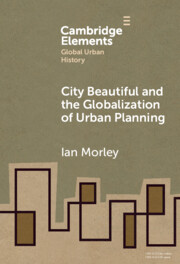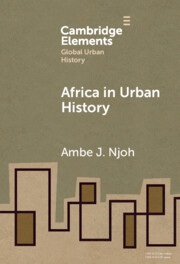678 results
26 - The Popes and the Government of the Papal States, 1800–1870
- from Part V - Papal States
-
-
- Book:
- The Cambridge History of the Papacy
- Published online:
- 28 February 2025
- Print publication:
- 20 March 2025, pp 679-704
-
- Chapter
- Export citation
The nature of the decentralised autonomous organisation
-
- Journal:
- Journal of Institutional Economics / Volume 21 / 2025
- Published online by Cambridge University Press:
- 28 February 2025, e5
-
- Article
-
- You have access
- Open access
- HTML
- Export citation
4 - Nazarbayev University
-
- Book:
- Pursuing Institutional Purpose
- Published online:
- 19 December 2024
- Print publication:
- 27 February 2025, pp 57-74
-
- Chapter
-
- You have access
- Open access
- HTML
- Export citation
2 - Asian University for Women
-
- Book:
- Pursuing Institutional Purpose
- Published online:
- 19 December 2024
- Print publication:
- 27 February 2025, pp 16-35
-
- Chapter
-
- You have access
- Open access
- HTML
- Export citation
8 - Conclusion
-
- Book:
- Bus Station Hustle
- Published online:
- 09 February 2025
- Print publication:
- 13 February 2025, pp 162-180
-
- Chapter
-
- You have access
- Open access
- HTML
- Export citation
3 - Sustainability, Circularity, LCA, and Governance
-
-
- Book:
- Bioprocesses
- Published online:
- 24 January 2025
- Print publication:
- 13 February 2025, pp 82-117
-
- Chapter
- Export citation
6 - Reforming the School System
-
-
- Book:
- Politics and Knowledge Shaping Educational Reform
- Published online:
- 06 February 2025
- Print publication:
- 13 February 2025, pp 79-98
-
- Chapter
- Export citation
Case studies of AI policy development in Africa
- Part of
-
- Journal:
- Data & Policy / Volume 7 / 2025
- Published online by Cambridge University Press:
- 10 February 2025, e15
-
- Article
-
- You have access
- Open access
- HTML
- Export citation

The City Beautiful and the Globalization of Urban Planning
-
- Published online:
- 30 January 2025
- Print publication:
- 30 January 2025
-
- Element
- Export citation

Africa in Urban History
-
- Published online:
- 30 January 2025
- Print publication:
- 30 January 2025
-
- Element
- Export citation
“It's Not the Climate, Stupid”: Exploring Nonideal Scenarios for Solar Geoengineering Development
-
- Journal:
- Ethics & International Affairs / Volume 38 / Issue 3 / Fall 2024
- Published online by Cambridge University Press:
- 23 January 2025, pp. 255-274
-
- Article
-
- You have access
- Open access
- HTML
- Export citation
3 - Rule-of-Law Backsliding
- from Part I - Introduction: Concepts and Empirics
-
-
- Book:
- The Rule of Law under Pressure
- Published online:
- 02 January 2025
- Print publication:
- 16 January 2025, pp 111-150
-
- Chapter
-
- You have access
- Open access
- HTML
- Export citation
The Post Office at Prayer? Auditing Risk and Practice: A Safeguarding Appraisal
-
- Journal:
- Journal of Anglican Studies / Volume 22 / Issue 2 / November 2024
- Published online by Cambridge University Press:
- 13 January 2025, pp. 460-476
-
- Article
-
- You have access
- HTML
- Export citation
6 - Kenya: Uneven Financial Statecraft
-
- Book:
- The Financial Statecraft of Borrowers
- Published online:
- 12 December 2024
- Print publication:
- 19 December 2024, pp 199-228
-
- Chapter
- Export citation
6 - Gambling Away Fraud: Tax and Speculative Governance in Slovakia
-
-
- Book:
- Anthropology and Tax
- Published online:
- 12 December 2024
- Print publication:
- 19 December 2024, pp 156-177
-
- Chapter
-
- You have access
- Open access
- HTML
- Export citation
11 - Egypt
-
-
- Book:
- States and their Nationals Abroad
- Published online:
- 04 December 2024
- Print publication:
- 05 December 2024, pp 256-275
-
- Chapter
- Export citation
How Did Human Rights Fare in Amendments to the International Health Regulations?
-
- Journal:
- Journal of Law, Medicine & Ethics / Volume 52 / Issue 4 / Winter 2024
- Published online by Cambridge University Press:
- 31 January 2025, pp. 907-921
- Print publication:
- Winter 2024
-
- Article
-
- You have access
- Open access
- HTML
- Export citation
9 - The Reform of the Port of London – Again
- from Part II - The Steam Era
-
- Book:
- Maritime Metropolis
- Published online:
- 21 November 2024
- Print publication:
- 28 November 2024, pp 240-263
-
- Chapter
- Export citation
9 - A State Letter from a Marwanid Caliph to his Governor of Iraq: A Historiographical Investigation into Khālid b. ʿAbd Allāh al-Qasrī’s Downfall
- from Part II - Institutions
-
-
- Book:
- Mechanisms of Social Dependency in the Early Islamic Empire
- Published online:
- 06 December 2024
- Print publication:
- 28 November 2024, pp 258-296
-
- Chapter
-
- You have access
- Open access
- Export citation
Conclusion
-
- Book:
- An Introduction to Law and Regulation
- Published online:
- 22 November 2024
- Print publication:
- 28 November 2024, pp 388-392
-
- Chapter
- Export citation

